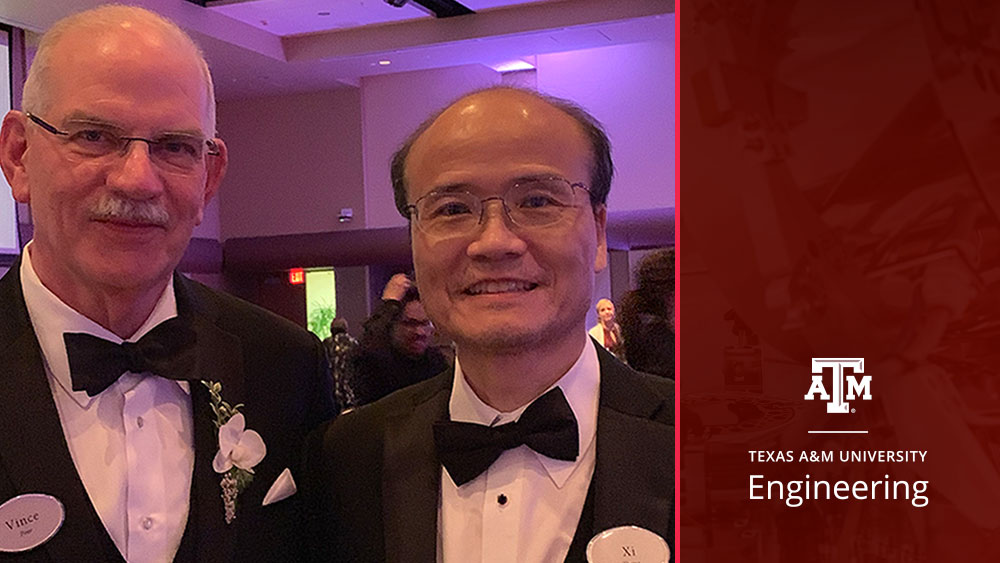
Since its inception in 2010, the Hagler Institute for Advanced Study at Texas A&M University has contributed to an increase in Texas A&M research funds, enriched student experience and expanded visibility of the institution by fostering collaborations between Texas A&M’s innovative faculty and students with prestigious scholars from around the world. These scholars deepen the intellectual climate and enhance Texas A&M’s multidisciplinary efforts to solve some of the most difficult problems faced by the world today.
The Department of Electrical and Computer Engineering at Texas A&M continues to benefit from collaborations with the Hagler Institute, including partnerships with Dr. Robert A. Calderbank, director of the Information Initiative at Duke University and professor of electrical engineering, computer science and mathematics; and Dr. H. Vincent Poor, Michael Henry Strater University Professor at Princeton University.
Dr. Xi Zhang, professor in the electrical and computer engineering department at Texas A&M, and his doctoral student Jingqing Wang co-authored a paper with Poor that received a best paper award at the Institute of Electrical and Electronics Engineers (IEEE) Global Communications Conference (GLOBECOM) in December 2020.
IEEE GLOBECOM is one of the most prestigious IEEE Communications Society Flagship Conferences dedicated to virtually all research fields of “networking, communications, signal processing, information theory, etc.” Only less than 0.37% papers are selected to receive the IEEE GLOBECOM 2020 Best Paper Award from all papers submitted at this conference.
“This paper’s research was also supported by mine and Dr. Vincent Poor’s National Science Foundation (NSF) grants, and its success in winning the IEEE GLOBECOM 2020 Best Paper Award not only represents the top-quality research accomplishments creating impactful technical breakthroughs but also plays crucial roles in significantly improving the qualities of our daily lives based on the imminent 6G and future-generation multimedia mobile wireless networking technologies,” Zhang said.
Zhang was also awarded an NSF grant for his research project, which is closely relevant to the collaborative research projects with Poor. In total, Zhang has co-authored more than 40 top-notch quality IEEE papers with Poor since they began collaborating.
“I have been greatly honored to be working with Dr. Poor, the world-class leader in mobile wireless networks,” Wang said. “As a student, it’s been really impactful to have a close-up view and contribute to cutting-edge research. By cooperating with Poor, together, we have had a number of research achievements.”
Calderbank participated as a Hagler Fellow from 2015-16. During his tenure, he worked alongside several faculty and graduate students on interdisciplinary research in big data.
Since 2010, the Hagler Institute has brought over 90 world-class scholars to Texas A&M. The result from this first decade is that more than 20% of fellows who have completed their time in the Hagler Institute have permanently joined as faculty of Texas A&M. The Hagler Institute is one of the only establishments of its kind in the country.
Princeton University has a similar establishment — the Institute for Advanced Study — that brought Albert Einstein as a collaborative faculty member. These organizations allow universities to collaborate with national academy and Nobel-prize caliber researchers that align with the existing strengths and ambitions of the university to enrich the educational experience of students and advance the research productivity of faculty.
A few prominent Hagler fellows include Dr. Ingrid Daubechies, who is among the world’s most cited mathematicians and is highly regarded for her study of wavelets; Dr. Roy Glauber, a pioneering theoretical physicist who laid the foundation of quantum optics and received the 2005 Nobel prize in physics for this work; Dr. Donna T. Strickland, who was awarded the 2018 Nobel Prize in physics for developing chirped-pulse amplification, used in corrective eye surgery, industrial machining and medical imaging; and Dr. Robert Kennicutt Jr., who is one of the most prominent astrophysicists in the world, having co-led the team that measured the rate of expansion in the universe.
The continuing stream of outstanding researchers brought to Texas A&M through the Hagler Institute is changing the cultural climate of the department, bringing new joint research and other activities with faculty members, and creating and maintaining professional networks within the field of electrical and computer engineering.